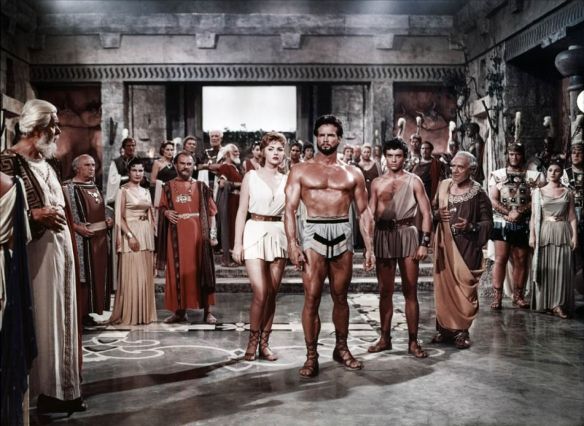Hello folks, and welcome back to Wrong Every Time. Today I am ensconced securely in my bedroom-office, savoring one of the few aspects of winter I actually enjoy: sitting inside while snow falls beyond my window, luxuriating in the fact that I’m in here and all that chilly white stuff is stuck out there. Yes, I will eventually have to go outside and unbury my car and get some goddamn provisions, but for now the snow is just a lovely change of scenery, a shroud concealing the dirt and dead leaves of New England in January. I’m not sure what it says about me that my appreciation for inclement weather depends entirely on the light schadenfreude of reveling in it not being my problem, but I have decided to forgive myself this unkindness, in light of everything else about winter sucking so terribly. And with the outdoors being so hostile, I’ve certainly had plenty of time to watch new movies, at least. Let’s run down a fresh collection of features in a brand-spanking-new Week in Review!
First up this week was the 1958 production of Hercules, a key feature in the mid-century sword-and-sandal boom. Steve Reeves stars as the titular hero, who runs through a loose amalgamation of several Hercules adventures, leaving out the messier escapades like that one time he murdered his wife and children. Instead, Hercules tackles perhaps a labor and a half, falls in love with the Princess Iole (in a significantly more sympathetic version of that tale), and chills with his buddy Jason, joining the Argonauts on their quest for the golden fleece.
I joke about how loosely this film represents Hercules’ canonical adventures, but in truth, basically every story about Hercules is a contradiction of several other stories, going back all the way to the original legends. The only choice that felt genuinely out of place was Hercules’ intelligence; though Reeves is a remarkable physical specimen, his version of Hercules is renowned as much for his brain as his brawn, which pretty much every story agrees is fundamentally un-Herculean.
But with a brainy Hercules at the helm, his adventures with the Argonauts proceed much like a series of original Star Trek episodes, as the crew disembark on various islands and inevitably find themselves in some jam requiring Hercules’ intervention. My experiences with ‘50s adventures had me sorely missing the absence of more Harryhausen-style stop-motion monsters, but I nonetheless had a fine time with Hercules and the gang; don’t hold out for too much action, luxuriate in the film’s sets and costumes, and let yourself enjoy some canonically suspect escapades.
Our next viewing was When Evil Lurks, a recent Argentinian horror film that was making big festival waves earlier this year. The film centers on brothers Pedro and Jaime, who first discover a dismembered corpse in the woods near their farm, then soon learn their neighbor’s son has become a “Rotten,” a carrier for a demon waiting to be born. Wishing to avoid the pestilence such a scourge would invoke on their homes, they conspire with local farmer Ruiz to dump the Rotten far from their homes, thereby inviting a terrible curse upon them and all of their loved ones.
When Evil Lurks triumphs through its marvelous fusion of scene-by-scene specificity and fantastical ambiguity. The precise nature of the curse they are fleeing only emerges piecemeal, as they stumble beyond one guideline after another in their attempts to quell the demon. Instead, the audience is left grappling in the same desperate ambiguity as the protagonists, with the gruesome finality of each flourish of possession driving them onward as surely as the clouds of an oncoming hurricane. That metaphor feels particularly appropriate for When Evil Lurks; though Pedro and Jaime keep seeking a miracle cure, their actions feel much like bargaining with a natural disaster, as hopeless as arguing with a tornado.
Through its wisely obscured mythology, When Evil Lurks presents a portrait of malevolence that reaches beyond its on-screen sequence of counterplays and preventative measures. Its title is well-chosen; beyond what we see, there is always a sense of lurking invasion, of a corruption approaching or perhaps even already here. Its character writing follows a similar method; the lives of its cast clearly sprawl beyond what we see in this moment, their dialogue gesturing towards hopes and disagreements that have no room for elaboration under the current circumstances. And beyond its eerie ambiguity, the film never skimps on horrifying visceral payoff; in fact, its flourishes of violence are so abrupt and terrible that they infuse the entire film with a sense of fragility, a feeling that any mundane action might end in the worst way possible. Just a phenomenal goddamn horror movie.
Next up was Snake in the Eagle’s Shadow, a ‘78 Jackie Chan feature filmed directly before Drunken Master, featuring the same director and much of the same cast. The story is as iconic as they come, with Jackie starring as an orphan who’s essentially treated as the whipping boy of a local martial arts school. A beggar takes pity on the boy and, recognizing his natural talent, begins to teach him his own style of kung fu. But little does Jackie know that his new skills are a deadly weapon in more ways than one, for his master’s “Snake Style” has already been brought to near extinction by a rival master – a master who’s not interested in leaving any loose ends.
The one-two punch of Snake in the Eagle’s Shadow and Drunken Master essentially formed the blueprint for Jackie’s later action-comedy routine. But Eagle’s Shadow doesn’t feel like a first draft; it’s as exciting and creatively generous as anything in Jackie’s catalog, while also establishing a narrative scaffolding that would go on to inspire generations of martial arts-adjacent narratives. Just as Jackie embodies the quintessential lackadaisical young hero, so does his master Pai Cheng-tien (Yuen Siu-tien) embody the rascally old sensei, establishing an archetype across this and Drunken Master that would endure through the Turtle Hermit and beyond.
But talking about Snake in the Eagle’s Shadow in terms of its influence likely sells the film short. As an experience in its own right, Eagle’s Shadow is brimming with playfully choreographed fights and remarkable feats of agility, embracing the young Jackie’s seemingly limitless energy without treating him in the reverential manner of many later Jackie features. Here he’s just a kid who lucks into finding the right master, is mostly oblivious to the drama surrounding him, and at one point takes martial arts lessons from his pet cat. It’s everything you’d want in a martial arts film.
We then checked out Death Wish, a ‘70s action-thriller starring Charles Bronson as Paul Kersey. Though a mild-mannered architect by nature, Kersey is driven to vigilantism after thugs break into his apartment, killing his wife and molesting his daughter. Taking justice into his own hands, Kersey roams the streets of New York with his trusty .38 pistol, killing whatever muggers and scoundrels he can find.
Like the contemporary Dirty Harry, Death Wish is an unrepentant conservative fantasy, a dream of the strong, capable man fighting back against the lawless barbarians. The specific particulars of Bronson’s transformation into Action Man are genuinely amusing in their pointedness; Bronson transforms from an effete east coast intellectual and conscientious objector into a pure agent of violence, having come to understand that our cowardly, almost womanly preference for civil systems and reform have only allowed the scum of the earth to propagate. Conservative philosophy is based on primal fears of losing status, and has no meaningful intellectual grounding; in Death Wish, the anxieties undergirding America’s most fascistic citizens are laid bare, an eager celebration of mankind’s most contemptible belief systems.
It’s a fun watch, though! Though Death Wish’s original writer Brian Garfield was smart enough to understand Kersey is a grotesque wreck, seeing Michael Winner’s film present him as a hero provides an undeniable rush. The film effectively builds up Kersey’s mystique as the “New York Vigilante,” and offers a fair number of chases and shootouts that wouldn’t feel out of place in The Taking of Pelham 123 or The French Connection. And Bronson is of course a somber and magnetic leading man, effectively selling his transformation from compliant liberal to iron-blooded avenger while maintaining a compelling inner core of smoldering grief. As a political statement, Death Wish is a bitter roar of adolescent rage – as a Bronson action vehicle, it’s a nasty but altogether enjoyable ride.




